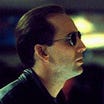Suddenly in the grips of night, howling Lurid curses along the arc of the moon, When Death is deep in her wearied cups, My heart is rent, pierced by a florid dart. I go, center-front my computer screen To enter the bustling, ivy-gated yard Of jagged angel wings on broken tombs, And search down the line of weathered graves, Each name I know—dreams of a man who's dead. As like a dream conceives its own Secret dream, and asks upon awake, Who are the dead? Front lit, the flaming glow reflected off my cheeks, Radiantly agleam amid the brown then black Of the light’s absence, retracted back into the moon. As like the mirror of lunar candescence, inverted, My dilated eye, reviewing widely the monuments On display, impermanently rooted in digital earth, The stones but planted in throes of harnessed light, Contacts and chips keeping tight hold of the wire reigns, Pulling back with uncaring abuse, absent in flesh, Unknowing the greater expanse beyond logic’s unreason. In chorus with those who carry knowledge Into the living, immortal heart, we ask, Who are the dead? There I sit, instruments in hand, rapt with divination, Flicking Fortuna's wheel, tracking the mousepad, Flurry of fleeting keys, spacebar's heart-throb thump, And off I've gone, strolling down the column's length, Small faces in plaques nestled in the dying grass, My eyes, my screen—the sentinel of their memory. Small voices summoned from their aching deaths, Coaxed from the grotto of wandering shades, They tease me with ghost dance at graveyard’s ball, And taunt me with their mausoleum's rest; Each whisper is lightning among the urns, And when I burn, I fall like ash among the ash. And wandering like a child among half-acre tombs, Lost and ignorant, echoing as the demoniac In sorrow’s chains, Who are the dead? Strewn across the desktop field, Icon littered, in peach blossom coat, Stretched limbs, patched bleak with bone pale, The sheer remnants of anguished minds, Grudged phantoms of torrid fear and trembling lust. Pixels degrade, a web of lichen overspread And burst, without well-wrought confines restraining The subtle, finely spun spirits rushing athwart Circuitous clasps of wavering love and unlove, The granite hewn and pitted slabs open And closing at whim of prompted command. As like gossamer shreds will flee Our grasp in springtime’s wind, Who are the dead? Though lovers pound the coffins of our loves, I haven't heart enough to crack the heavy lids, And let the revenants catch their breath To haunt my solitary dreams again; Or love them back to life once more, Imbibing cold kisses, now long embalmed, To taste the poison in their thin gray lips. Cut apart, them and I, by walls of the bounding box, Walls without windows in windows without walls, The screen buries all, fading away in their plots, Are there they laid, or only stored in memory? As like a fiend who searches tomes, frantic, Looking for ways of necromancy, Who are the dead? Dead or nay, it matters not when the demons rise, When Lady Death rides out her harem Of the compiled, indexed, blind-deaf dead, Like the single face of a thousand crowd, They look without sight, though I look at them, I see without been seen, and know them, And they know not me, voyeur of the digital dead. The faces linger after death and still before, They linger alive on the flat black slate, And burn their visage faint upon the void; This world encased in the electric grave, Running there dead on top my desk. I press my face into the keys and cry, Who are the dead? Who are the dead?
Discussion about this post
No posts





You mimic perfectly the grand manner of the Tate poem. Of course, there's no Antietam or Shiloh or Malvern Hill as backdrop to the theatrical luridness, giving the piece a macabre kind of irony. Your recitation surprised me, too. Are you a Southerner?
I like this, but reading it, I realize how foreign the topic of computer screens is to poem and prose. Certain references are quite jarring, though that is used to good effect.
"This world encased in the electric grave"
This line stuck out to me because of how 'electric' is used in common parlance. That is, something new, inspiring, and attention grabbing. I know I'm suppose to understand the use of the word here as the electric drone of TV static, but I wasn't fully persuaded. That is likely not the main point of the poem, of course. Rather, I was struck by how the chief struggle in communicating the deadness of digital technology is in getting words we've been using as synonymous with "living" to mean "deadening."